| Listing 1 - 10 of 56 | << page >> |
Sort by
|

ISBN: 1281372722 9786611372729 9812701400 9789812701404 9781281372727 9789812389183 9812389180 9812389180 Year: 2005 Publisher: Singapore ; Hackensack, NJ : World Scientific Pub.,
Abstract | Keywords | Export | Availability | Bookmark
 Loading...
Loading...Choose an application
- Reference Manager
- EndNote
- RefWorks (Direct export to RefWorks)
In the domain of science concerned with systems structure and behavior, the issue of the relationship between the micro and the macro level is of key importance. This book concentrates on the interplay between these levels and has a special focus on the level "in between" - the meso level. An investigation of those links is made through a number of cases from different domains of science, including physics, chemistry, ecology, social science, economics and technology. What is evident is that there are facets regarding meso-level issues that are similar between cases, but also that the domains
System theory. --- Science --- Normal science --- Philosophy of science --- Systems, Theory of --- Systems science --- Philosophy. --- Philosophy
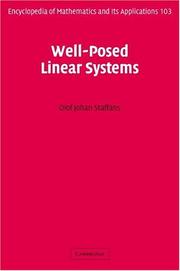
ISBN: 0521825849 9780521825849 9780511543197 0511082088 9780511082085 0511081634 9780511081637 0511543190 0511298404 9780511298400 1107137802 128043113X 9786610431137 0511171315 0511197012 Year: 2005 Volume: 103 Publisher: Cambridge Cambridge University Press
Abstract | Keywords | Export | Availability | Bookmark
 Loading...
Loading...Choose an application
- Reference Manager
- EndNote
- RefWorks (Direct export to RefWorks)
Many infinite-dimensional linear systems can be modelled in a Hilbert space setting. Others, such as those dealing with heat transfer or population dynamics, need to be set more generally in Banach spaces. This is the first book dealing with well-posed infinite-dimensional linear systems with an input, a state, and an output in a Hilbert or Banach space setting. It is also the first to describe the class of non-well-posed systems induced by system nodes. The author shows how standard finite-dimensional results from systems theory can be extended to these more general classes of systems, and complements them with new results which have no finite-dimensional counterpart. Much of the material presented is original, and many results have never appeared in book form before. A comprehensive bibliography rounds off this work which will be indispensable to all working in systems theory, operator theory, delay equations and partial differential equations.
System theory --- Linear systems --- Linear systems. --- System theory. --- Systems, Theory of --- Systems science --- Science --- Systems, Linear --- Differential equations, Linear --- Philosophy

ISBN: 1281379220 9786611379223 9812774750 9789812774750 9812564675 9789812564672 981256389X 9789812563897 9781281379221 Year: 2005 Publisher: Singapore ; Hackensack, NJ : World Scientific,
Abstract | Keywords | Export | Availability | Bookmark
 Loading...
Loading...Choose an application
- Reference Manager
- EndNote
- RefWorks (Direct export to RefWorks)
Science --- System theory. --- Systems, Theory of --- Systems science --- Normal science --- Philosophy of science --- Philosophy. --- Philosophy --- Théorie des systèmes
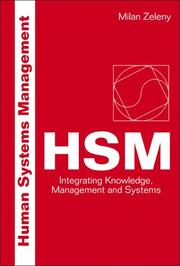
ISBN: 9810249136 9786611372972 1281372978 9812703535 9789810249137 9789812703538 9781281372970 Year: 2005 Publisher: Hackensack, NJ : World Scientific Pub.,
Abstract | Keywords | Export | Availability | Bookmark
 Loading...
Loading...Choose an application
- Reference Manager
- EndNote
- RefWorks (Direct export to RefWorks)
Human Systems Management is an important work that integrates knowledge, management and systems into a unified world of thinking and action in business, decision-making and economics. It presents a modern synthesis of the fields of knowledge management, systems science and human organization. A biological rather than mechanistic perspective pervades the text. New and original ideas and approaches are presented with the simplicity and clarity typical of the well-known author.
Knowledge management. --- Management --- Business & Economics --- Management Theory --- System theory. --- Organizational effectiveness. --- Systems, Theory of --- Systems science --- Management of knowledge assets --- Science --- Organization --- Information technology --- Intellectual capital --- Organizational learning --- Philosophy
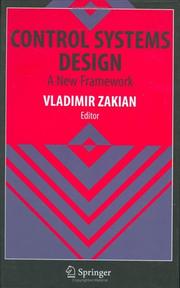
ISBN: 1280411953 9786610411955 1846282152 1852339136 Year: 2005 Publisher: New York : Springer Science,
Abstract | Keywords | Export | Availability | Bookmark
 Loading...
Loading...Choose an application
- Reference Manager
- EndNote
- RefWorks (Direct export to RefWorks)
In recent decades, a comprehensive new framework for the theory and design of control systems has emerged. This framework is based on a radically different foundation from the conventional approach. It treats a range of significant and ubiquitous design problems, including those of critical systems, more effectively than the conventional framework. Control Systems Design brings together contributions from the originators of the new framework in which they explain, expand and revise their research work in the field with more recent and entirely novel material. The book also demonstrates how the conventional design framework can be made more effective by the use of the principle of inequalities. It is divided into four parts: • basic principles, including those of matching and inequalities with adjustments for robust matching and matching based on H-infinity methods and linear matrix inequalities; • computational methods, including matching conditions for transient inputs and design of a sampled-data control system; • search methods including search with simulated annealing, genetic algorithms and evaluation of the node array method; • case studies, including applications in distillation, benchmarking critical control of magnetic levitation systems and the use of the principle of matching in cruise control. This book will be of great interest to academics and institutional researchers in control system design and to those studying for higher degrees in this area.
Automatic control. --- Control theory. --- Dynamics --- Machine theory --- Control engineering --- Control equipment --- Control theory --- Engineering instruments --- Automation --- Programmable controllers --- Systems theory. --- Engineering design. --- Control, Robotics, Mechatronics. --- Systems Theory, Control. --- Engineering Design. --- System theory. --- Design, Engineering --- Engineering --- Industrial design --- Strains and stresses --- Systems, Theory of --- Systems science --- Science --- Design --- Philosophy --- Control engineering. --- Robotics. --- Mechatronics. --- Mechanical engineering --- Microelectronics --- Microelectromechanical systems

ISBN: 1280337370 9786610337378 3540285024 3540245464 Year: 2005 Publisher: Berlin ; New York : Springer,
Abstract | Keywords | Export | Availability | Bookmark
 Loading...
Loading...Choose an application
- Reference Manager
- EndNote
- RefWorks (Direct export to RefWorks)
The purpose of this book is to describe recent developments in solving eig- value problems, in particular with respect to the QR and QZ algorithms as well as structured matrices. Outline Mathematically speaking, the eigenvalues of a square matrix A are the roots of its characteristic polynomial det(A??I). An invariant subspace is a linear subspace that stays invariant under the action of A. In realistic applications, it usually takes a long process of simpli?cations, linearizations and discreti- tions before one comes up with the problem of computing the eigenvalues of a matrix. In some cases, the eigenvalues have an intrinsic meaning, e.g., for the expected long-time behavior of a dynamical system; in others they are just meaningless intermediate values of a computational method. The same applies to invariant subspaces, which for example can describe sets of initial states for which a dynamical system produces exponentially decaying states. Computing eigenvalues has a long history, dating back to at least 1846 when Jacobi [172] wrote his famous paper on solving symmetric eigenvalue problems. Detailed historical accounts of this subject can be found in two papers by Golub and van der Vorst [140, 327].
Eigenvalues. --- Structural analysis (Engineering) --- Matrix methods. --- Matrices --- Computer science --- Systems theory. --- Computer science. --- Computational Mathematics and Numerical Analysis. --- Systems Theory, Control. --- Computational Science and Engineering. --- Mathematics. --- System theory. --- Informatics --- Science --- Computer mathematics --- Discrete mathematics --- Electronic data processing --- Systems, Theory of --- Systems science --- Mathematics --- Philosophy --- Computer mathematics. --- Control theory. --- Systems Theory, Control . --- Data processing. --- Dynamics --- Machine theory
Book
ISBN: 3540264108 Year: 2005 Volume: 48 Publisher: Berlin : Springer-Verlag,
Abstract | Keywords | Export | Availability | Bookmark
 Loading...
Loading...Choose an application
- Reference Manager
- EndNote
- RefWorks (Direct export to RefWorks)
This book presents the mathematical foundations of systems theory in a self-contained, comprehensive, detailed and mathematically rigorous way. This first volume is devoted to the analysis of dynamical systems with emphasis on problems of uncertainty, whereas the second volume will be devoted to control. It combines features of a detailed introductory textbook with that of a reference source. The book contains many examples and figures illustrating the text which help to bring out the intuitive ideas behind the mathematical constructions. It is accessible to mathematics students after two years of mathematics and graduate engineering students specializing in mathematical systems theory. The reader is gradually brought to the frontiers of research in stability and robustness analysis. As such the book will be useful for established researchers in systems theory as well as mathematicians and engineers interested in the mathematical foundations of systems and control. From the reviews: "This textbook on finite-dimensional time-invariant linear systems theory ... links up with the extensive research contributions of the authors, geared towards developing a spectral theory for uncertain systems. ... is bound to become a standard textbook and reference in its area." M. Kawski, Mathematical Reviews, 2005 "... the content ranges from rigorous proofs of basic results in linear systems theory to new results on the research frontier. In that sense, the book also serves as a valuable research reference." W.J. Satzer, MathDL, May, 2005 "I heartily recommend this book as a remarkably complete reference for researchers doing theoretical work involving linear systems. The book is a unique compilation of the mathematics underlying the field, and I look forward to seeing the authors' treatment of synthesis problems in the second volume." Brian Ingalls, IEEE Control Systems Magazine, April 2006 "MST-1 can be properly deemed an essential addition to the personal library of any researcher in systems theory. ...the authors indicate that MST-I was developed over a twenty-year period and the enormous effort that they have invested in writing the book is readily apoparent. MST-I is a superb exposition of advanced aspects of linear systems theory and is highly recommended for graduate students and researchers who have some prior background in control-systems and who have specific interests in problems of stability, robustness, and uncertainty. If the authors are able to maintain their high standards of exposition through the promised second volume, then MST-I and -II are destined to be placed among the pre-eminent authoritative references for the area of controlled dynamical systems." K.A. Grasse, IEEE Trans. Automatic Control 51, April 2006 "... This book is one of the best books on the subject." A.O. Ignatyev, Zentralblatt MATH 1074 :l.
Differentiable dynamical systems. --- Mathematical optimization. --- System theory. --- Systems, Theory of --- Systems science --- Science --- Philosophy --- Optimization (Mathematics) --- Optimization techniques --- Optimization theory --- Systems optimization --- Mathematical analysis --- Maxima and minima --- Operations research --- Simulation methods --- System analysis --- Differential dynamical systems --- Dynamical systems, Differentiable --- Dynamics, Differentiable --- Differential equations --- Global analysis (Mathematics) --- Topological dynamics
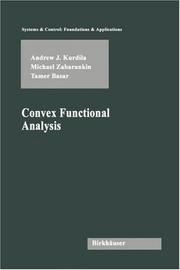
ISBN: 1280263768 9786610263769 3764373571 3764321989 Year: 2005 Publisher: Basel : Birkhäuser Basel : Imprint: Birkhäuser,
Abstract | Keywords | Export | Availability | Bookmark
 Loading...
Loading...Choose an application
- Reference Manager
- EndNote
- RefWorks (Direct export to RefWorks)
This volume is dedicated to the fundamentals of convex functional analysis. It presents those aspects of functional analysis that are extensively used in various applications to mechanics and control theory. The purpose of the text is essentially two-fold. On the one hand, a bare minimum of the theory required to understand the principles of functional, convex and set-valued analysis is presented. Numerous examples and diagrams provide as intuitive an explanation of the principles as possible. On the other hand, the volume is largely self-contained. Those with a background in graduate mathematics will find a concise summary of all main definitions and theorems. Contents: Classical Abstract Spaces in Functional Analysis Linear Functionals and Linear Operators Common Function Spaces in Applications Differential Calculus in Normed Vector Spaces Minimization of Functionals Convex Functionals Lower Semicontinuous Functionals.
Functional analysis. --- Convex functions. --- Mathematical optimization. --- Existence theorems. --- Differential equations --- Mathematical physics --- Optimization (Mathematics) --- Optimization techniques --- Optimization theory --- Systems optimization --- Mathematical analysis --- Maxima and minima --- Operations research --- Simulation methods --- System analysis --- Functions, Convex --- Functions of real variables --- Functional calculus --- Calculus of variations --- Functional equations --- Integral equations --- System theory. --- Systems Theory, Control. --- Systems, Theory of --- Systems science --- Science --- Philosophy --- Systems theory.
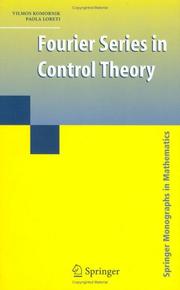
ISBN: 0387274081 0387223835 1441919759 Year: 2005 Publisher: New York, NY : Springer New York : Imprint: Springer,
Abstract | Keywords | Export | Availability | Bookmark
 Loading...
Loading...Choose an application
- Reference Manager
- EndNote
- RefWorks (Direct export to RefWorks)
Advance Praise for Fourier Series in Control Theory: It has been known since 1967 that a wide variety of sets of complex exponential functions play an important role in the control theory of systems governed by partial differential equations. Up until now, the relevant literature has been scattered among various journal articles, a survey paper by myself in SIAM Review in 1978, and the book, Families of Exponentials, by S. Avdonin and S. Ivanov (1995). Fourier Series in Control Theory successfully gathers all of the available theory of these "nonharmonic Fourier series" in one place, combining published results with new results, to create a unique source of such material for practicing applied mathematicians, engineers, and other scientific professionals. - David Russell, Virginia Polytechnic Institute and State University This monograph will be of interest to experts and researchers, as well as graduate students in such courses as control series and harmonic analysis. Starting with an overview of the problems of observability, controllability, and stabilization of linear systems and their interconnections, the text contains complete proofs along with a short, simplified, presentation of some properties of Bessel functions for the convenience of the reader. Only basic knowledge of functional analysis is required.
Control theory. --- Fourier series. --- Fourier integrals --- Series, Fourier --- Series, Trigonometric --- Trigonometric series --- Calculus --- Fourier analysis --- Harmonic analysis --- Harmonic functions --- Dynamics --- Machine theory --- Systems theory. --- Mathematical optimization. --- Systems Theory, Control. --- Calculus of Variations and Optimal Control; Optimization. --- System theory. --- Optimization (Mathematics) --- Optimization techniques --- Optimization theory --- Systems optimization --- Mathematical analysis --- Maxima and minima --- Operations research --- Simulation methods --- System analysis --- Systems, Theory of --- Systems science --- Science --- Philosophy --- Calculus of variations. --- Isoperimetrical problems --- Variations, Calculus of
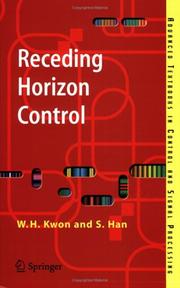
ISBN: 1846280176 1846280249 Year: 2005 Publisher: London : Springer London : Imprint: Springer,
Abstract | Keywords | Export | Availability | Bookmark
 Loading...
Loading...Choose an application
- Reference Manager
- EndNote
- RefWorks (Direct export to RefWorks)
Receding Horizon Control introduces the essentials of a successful feedback strategy that has emerged in many industrial fields: the process industries in particular. Receding horizon control (RHC) has a number of advantages over other types of control: easier computation than steady-state optimal control; greater adaptability to parametric changes than infinite horizon control; better tracking than PID and good constraint handling among others. The text builds understanding starting with optimal controls for simple linear systems and working through constrained systems to nonlinear cases. RHC is applied to discrete-time systems for better understanding and easier computer application. Its diverse techniques are unified using the state-space framework. Worked examples and exercises throughout the book allow you to practise as you go. MATLAB® files for the solution of selected examples can be downloaded from http://extras.springer.com. Graduate students following masters and doctoral courses in control theory and engineering will find Receding Horizon Control to be an excellent companion to tuition and research. Tutors and academics researching model predictive control can use this not only as a scholarly textbook but as a co-ordinated reference for its wide range of receding horizon schemes.
Predictive control. --- Engineering. --- Biochemical engineering. --- Chemical engineering. --- System theory. --- Mechanical engineering. --- Control engineering. --- Electrical engineering. --- Control. --- Electrical Engineering. --- Biochemical Engineering. --- Systems Theory, Control. --- Industrial Chemistry/Chemical Engineering. --- Mechanical Engineering. --- Electric engineering --- Engineering --- Control engineering --- Control equipment --- Control theory --- Engineering instruments --- Automation --- Programmable controllers --- Engineering, Mechanical --- Machinery --- Steam engineering --- Systems, Theory of --- Systems science --- Science --- Chemistry, Industrial --- Engineering, Chemical --- Industrial chemistry --- Chemistry, Technical --- Metallurgy --- Bio-process engineering --- Bioprocess engineering --- Biochemistry --- Biotechnology --- Chemical engineering --- Construction --- Industrial arts --- Technology --- Philosophy --- Model based predictive control --- Model predictive control --- Automatic control --- Computer engineering. --- Systems theory. --- Control and Systems Theory. --- Computers --- Design and construction --- Automatic control.
| Listing 1 - 10 of 56 | << page >> |
Sort by
|

 Search
Search Feedback
Feedback About UniCat
About UniCat  Help
Help News
News